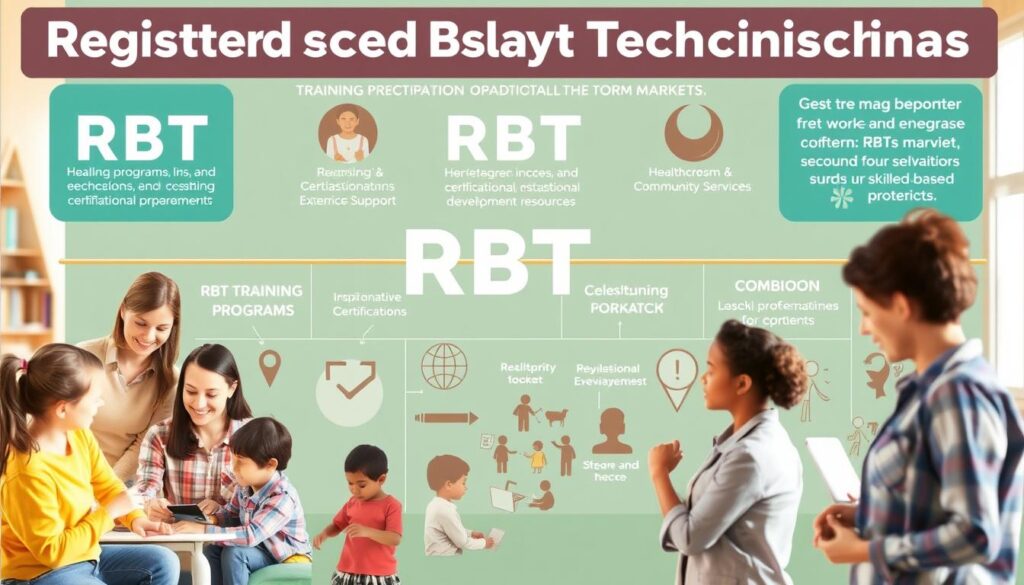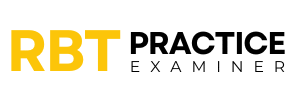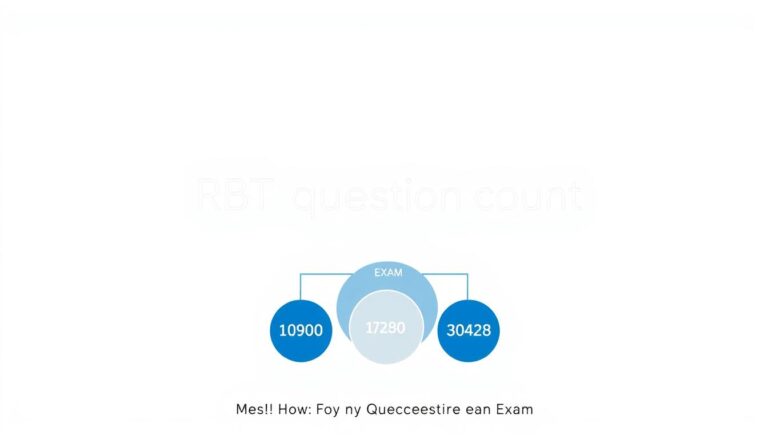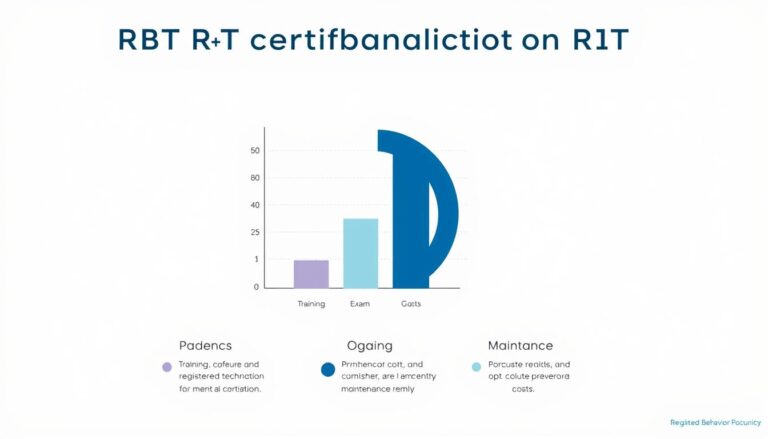RBT: Is It a Rewarding Career Choice? Find Out Now
Are you thinking about becoming a registered behavior technician? This job lets you make a real difference in people’s lives. It’s also a stable career in healthcare.
Is RBT a good job? Yes, it is. You get to work closely with people who need help. You help them learn important life skills. RBTs are key in ABA therapy, helping kids and adults with autism.
To be an RBT, you need to be dedicated and caring. You’ll work with BCBAs to create treatment plans. Your work helps people grow and improves family life.
If you want a job that really matters, RBT is for you. There’s a big need for autism support, making this job stable and rewarding. You’ll have the chance to make a big difference in people’s lives.
Understanding the Role of a Registered Behavior Technician
Registered Behavior Technicians (RBTs) are vital in applied behavior analysis. They support people with developmental challenges. These professionals are key to behavioral health teams, giving direct help to clients.
RBTs mainly work with those who have autism, developmental disabilities, and behavioral health issues. The need for RBTs is growing as more people seek specialized care in the U.S.
Core Responsibilities and Daily Tasks
An RBT’s day is filled with important tasks. They carry out plans made by Board Certified Behavior Analysts (BCBAs). Their main duties include:
- Leading one-on-one therapy sessions
- Tracking and recording behavior
- Teaching social and communication skills
- Helping with skill development and independence
Required Qualifications and Certifications
Becoming an RBT offers a clear path to certification. To start, candidates need to meet certain criteria:
- High school diploma or equivalent
- Complete a 40-hour training program
- Pass a background check
- Pass the RBT competency assessment
- Pass the RBT certification exam
Working Environment and Settings
RBTs work in various settings, providing many job opportunities. These include:
| Work Setting | Description |
|---|---|
| Schools | Supporting students with special needs |
| Clinics | Providing specialized behavioral interventions |
| Home-based Services | Delivering personalized therapy in family environments |
| Residential Facilities | Supporting individuals with complex behavioral needs |
RBTs make a big difference in clients’ lives. They help them develop important skills and improve their quality of life.
The Journey to Becoming an RBT: Training and Certification Process
Starting a career as a registered behavior technician needs a clear training and certification plan. Those wanting to be RBTs must follow a detailed path. This ensures they’re ready to help people with behavioral issues.
The certification process has several important steps for those aiming to be RBTs:
- Complete a 40-hour training program
- Pass a background check
- Get supervised practical experience
- Pass the RBT certification exam
- Keep up with ongoing supervision needs
Key things needed for RBT certification include:
| Requirement | Details |
|---|---|
| Minimum Age | 18 years old |
| Education | High school diploma or equivalent |
| Training Hours | 40-hour approved training program |
| Supervision | Ongoing monthly supervision by a BCBA |
The Behavior Analyst Certification Board (BACB) manages the RBT certification. Candidates must finish a detailed training that teaches key skills in behavior intervention and ethics. The certification test checks their practical knowledge and understanding of applied behavior analysis.
To keep certification, RBTs need to keep learning and renew their certification often. They must do yearly competency checks and work under a BCBA’s direct supervision.
Is RBT a Good Job? Analyzing Career Satisfaction
Registered Behavior Technicians (RBTs) support people with behavioral challenges. They find joy in this rewarding career. It’s a job that makes a difference.
The field of behavioral health is special. It offers chances to help others. RBTs find happiness in their work for many reasons.
Job Satisfaction Rates Among RBTs
Studies show RBTs are very happy with their jobs. They choose this career for many good reasons. These include:
- Direct impact on client’s developmental progress
- Opportunity to work with diverse populations
- Meaningful interactions that create lasting change
- Competitive entry-level compensation
Work-Life Balance Considerations
RBT jobs often have flexible hours. This is great for many reasons. It lets them:
- Choose part-time or full-time work
- Select various work settings
- Maintain a balanced personal and professional life
Professional Growth Opportunities
The RBT role is a great starting point for a career. It offers many chances to grow. People can:
- Gain valuable clinical experience
- Pursue advanced certifications
- Explore specializations in behavioral health
- Develop transferable skills for future roles
RBT job satisfaction goes beyond money. It’s about personal growth and helping others.
Salary Expectations and Compensation Benefits for RBTs
Looking into the RBT career shows great financial chances in the behavioral health world. Registered Behavior Technicians get good pay for their important work with people with developmental issues.
RBTs usually make between $35,000 and $45,000 a year. This can change based on where you work, how long you’ve been doing it, and the setting. Places with higher living costs often pay more.
Compensation Breakdown for RBTs
- Base Salary: $35,000 – $45,000 per year
- Hourly Rates: $15 – $25 per hour
- Geographic Pay Variations: Up to 20% difference between regions
Being an RBT offers more than just a salary. Many jobs come with great benefits like:
- Health Insurance coverage
- Retirement planning options
- Paid time off
- Professional development opportunities
- Continuing education support
As you grow in your career, your pay can go up. You can earn more by getting more experience, getting extra certifications, and focusing on certain areas of behavioral help.
If you want to make more money, think about getting a Board Certified Behavior Analyst (BCBA) certification. It can really boost your salary and job chances.
Career Growth and Advancement Opportunities in Behavioral Health
The field of behavioral health is full of exciting RBT career paths. It’s perfect for those who want to make a real difference. By focusing on career growth and learning, RBTs can find many job opportunities.
There are many ways for professionals to grow in this field. Starting as an RBT and moving up to more advanced roles is possible. This path offers chances to specialize and make a bigger impact on people’s lives.
Pathway to BCBA Certification
Getting a Board Certified Behavior Analyst (BCBA) certification is a great way to advance. This step requires:
- Getting a master’s degree in behavior analysis or a related field
- Accumulating supervised clinical hours
- Passing the BCBA exam
Specialization Options
RBTs can choose from many specializations to boost their careers. Some options include:
- Autism Spectrum Disorder Intervention
- Organizational Behavior Management
- Developmental Disabilities Support
- Mental Health Behavioral Interventions
Leadership Roles
Experienced RBTs can move into leadership roles. This opens up new opportunities to make a bigger impact. Some leadership positions include:
- Program Coordinator
- Clinical Supervisor
- Training Director
- Behavioral Health Consultant
To succeed, it’s important to keep learning, network, and stay updated with new research and practices in behavioral health.
The Impact of RBTs on Client Success Stories

Registered Behavior Technicians (RBTs) change lives for the better. They help people with developmental challenges reach their goals. Becoming an RBT is more than a job; it’s a chance to make a real difference.
Sarah, a young girl with autism, shows the power of RBTs. At first, talking was hard for her. But with her RBT’s help, she learned to communicate better and connect with others.
- Improved social interaction skills
- Enhanced communication abilities
- Increased independence
- Better emotional regulation
Michael’s story is another example of RBT success. He faced challenges with sensory processing. But with his RBT’s guidance, he learned to handle everyday situations better.
RBTs are more than just workers. They are caring change-makers who unlock people’s true abilities. Their training lets them create plans that meet each client’s needs, leading to lasting changes.
These stories show that being an RBT is more than a job. It’s a chance to change lives, one step at a time.
Challenges and Rewards of Working as an RBT
Thinking about a career as a Registered Behavior Technician (RBT) shows a mix of good and tough parts. Is RBT a good job? It depends on knowing both the hard parts and the great benefits.
Working as an RBT can be very rewarding. You get to help people in big ways. It takes a lot of patience, emotional strength, and support to do this job well.
Emotional and Physical Demands
RBT jobs come with special challenges. They push you to your limits:
- Dealing with clients’ strong emotions
- Doing hands-on work that requires physical effort
- Feeling burned out
- Handling tough behavioral situations
Success Stories and Positive Outcomes
Even with the tough parts, RBT jobs offer great chances to grow. Seeing clients improve is incredibly rewarding. It makes all the hard times worth it.
Good RBTs learn extraordinary skills in:
- Talking to people well
- Using smart ways to change behavior
- Understanding emotions
- Being flexible and adaptable
The best part of being an RBT is seeing real changes. It’s amazing to see kids talk for the first time or people learn important life skills. It’s about making a difference that touches families.
Job Market Analysis and Employment Outlook for RBTs

The job market for RBTs is growing fast in the behavioral health field. Those looking for RBT jobs will find a lot of opportunities. Studies show a big need for Registered Behavior Technicians in many healthcare places.
Several things are making the RBT job market strong:
- More kids are being diagnosed with autism.
- More people know about the importance of behavior interventions.
- Healthcare services for developmental disabilities are getting bigger.
- More insurance plans cover behavioral health treatments.
Statistics show RBTs have a bright future. The Bureau of Labor Statistics says there will be more jobs in behavioral health. Places like schools, clinics, and private practices need RBTs.
Some areas really need RBTs:
- California
- Texas
- Florida
- New York
- Illinois
RBTs can look forward to good pay and chances to move up in their careers. The job market is growing, and more places see how important RBTs are. They help people with developmental challenges a lot.
Essential Skills and Qualities for Successful RBTs
Being a registered behavior technician is more than just a job. It needs a mix of technical skills and personal qualities. Success in this field comes from having both the right skills and personal traits that help in behavioral intervention.
To be a top RBT, you need more than basic knowledge. The best ones have special skills that help them make a real difference in people’s lives.
Technical Skills for RBT Success
- Precise data collection and documentation
- Understanding of Applied Behavior Analysis (ABA) principles
- Skill in implementing behavior intervention plans
- Proficiency with behavior tracking software
- Knowledge of developmental milestones
Critical Soft Skills That Define Top RBTs
While technical skills are key, soft skills make an RBT stand out. Emotional intelligence is vital for connecting with clients and understanding their needs.
- Exceptional patience and empathy
- Strong communication abilities
- Active listening skills
- Adaptability in challenging situations
- Genuine compassion for client progress
Working on these skills can turn a regular job into a rewarding journey of growth and support for clients.
Work Settings and Environment Options for RBTs

Registered Behavior Technicians (RBTs) have many job options in different places. Knowing these settings helps new professionals pick the best job for them.
RBTs can find jobs in several main places:
- Schools and Educational Settings
- Special education classrooms
- Individual student support
- Collaborative learning programs
- Clinical Environments
- Autism treatment centers
- Behavioral health clinics
- Pediatric therapy offices
- Home-Based Services
- One-on-one patient interventions
- Family support programs
- Personalized behavioral strategies
Every place has its own challenges and benefits for RBTs. Schools offer structured work with students. Clinical settings focus on specific behavioral help. Home-based services provide close, personal support.
Job chances for RBTs keep growing in these varied settings. People can pick places that fit their skills, kindness, and goals. RBT jobs offer flexibility and the chance to really help others.
Building a Strong Professional Network in Behavioral Health
Building a strong professional network is key for success as a registered behavior technician. Networking opens doors to new opportunities, personal growth, and career advancement in behavioral health.
Strategic networking can change your career path as a registered behavior technician. Here are some ways to grow your professional connections:
- Join professional organizations dedicated to behavioral health
- Attend regional and national conferences
- Engage with online professional communities
- Participate in continuing education workshops
Social media platforms are great for networking for RBTs. LinkedIn is a professional space to connect with others, share insights, and find jobs. Professional forums and groups help you stay updated with trends and expand your knowledge.
Mentorship is vital for a successful career as a registered behavior technician. Look for experienced professionals to guide you, offer advice, and share insights into advanced career paths.
Key networking strategies include:
- Creating a detailed professional profile
- Attending industry-specific events
- Participating in collaborative research projects
- Engaging in meaningful professional discussions
Remember, effective networking is about building real relationships. Focus on creating meaningful connections, sharing knowledge, and showing your dedication to growth in behavioral health.
Comparing RBT to Other Healthcare Career Options
Looking into RBT career options shows a great chance in healthcare. Registered Behavior Technicians have special benefits compared to other jobs. This makes it a great choice for those who want to help others.
When thinking if RBT is a good job, look at several key points. These points make this role stand out from others in healthcare.
Salary Landscape for Healthcare Professionals
Salary is a big factor in choosing a career. Let’s look at average salaries for different healthcare jobs:
| Healthcare Role | Average Annual Salary | Job Growth Projection |
|---|---|---|
| Registered Behavior Technician | $39,500 | 12-15% |
| Medical Assistant | $35,850 | 10% |
| Nursing Assistant | $30,290 | 8% |
| Patient Care Technician | $36,200 | 9% |
Career Stability Analysis
RBT careers offer great stability and growth. The main benefits are:
- Higher than average job growth rate
- Increasing demand for behavioral health professionals
- Opportunities for specialization
- Clear pathway to advanced certifications
For those looking for a dynamic and rewarding healthcare career, RBT is a top choice. It offers competitive salaries, a strong job market, and meaningful work. This makes it an excellent career option.
Tips for Landing Your First RBT Position
Starting a career as a Registered Behavior Technician (RBT) is exciting. It’s a growing field for those who want to help people with behavioral challenges. It’s a great choice for those passionate about making a difference.
Thinking about becoming an RBT? Here are some steps to get you started:
- Get your RBT certification from a trusted program
- Make a resume that shows your skills and experiences
- Meet people in the behavioral health field
- Get hands-on experience through internships or volunteering
Creating a strong job application is key. Show your technical skills, compassion, and dedication to helping others. Employers look for patience, good communication, and a real desire to help people with developmental disabilities.
Here are some tips for finding a job:
- Use job boards for healthcare jobs
- Reach out to autism centers and behavioral health clinics
- Go to workshops for professional growth
- Make a LinkedIn profile to show off your RBT skills
Interview prep is essential. Learn about the company, practice common questions, and talk about why you love helping others. There are many job opportunities for RBTs for those who are professional and truly care about their clients.
Conclusion
Being a Registered Behavior Technician is a chance to really help people with developmental challenges. This job mixes personal growth, satisfaction, and meaningful work. It’s different from most healthcare jobs.
Getting to be an RBT takes hard work and special training. But it’s great for those who care about behavioral health. You’ll learn important skills, work in many places, and help clients and their families a lot. It’s perfect for those who are patient, empathetic, and want to support people with autism and other conditions.
If you’re thinking about being an RBT, think about your strengths, goals, and love for helping others. The job world offers good jobs, fair pay, and chances to grow like getting a BCBA certification. Knowing the good and bad can help you see if this job fits your dreams and values.
If you’re interested in this rewarding job, start by learning about the certification, talking to RBTs, and looking into training programs. Starting as an RBT could lead to a very rewarding career.







